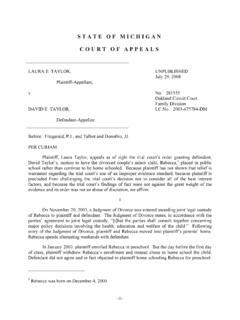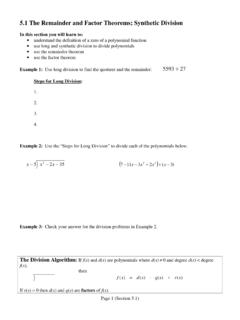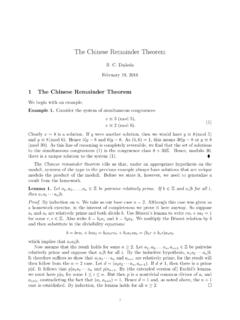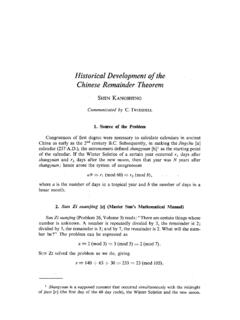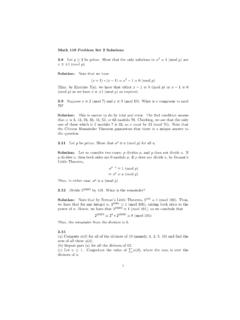Transcription of Use of Plain English in Drafting Wills and Trusts
1 Use of Plain English inDrafting Wills and TrustsBy Robert B. JoslynPurposeT he use of Plain English as a writingstyle for legal documents has twostated goals -readability and accuracy[see Alterman, Plain and AccurateStyle in Lawsuit Papers, MBJ 964(November, 1983)]. Considering that aclient's will and trust agreement are theprimary (if not the exclusive) docu-ments determining the time and man-ner of disposition of his wealth, it isvital that their wording provide asmuch clarity as possible -not justto other professionals ( , attorneys,bank and trust officers, court officials,tax authorities, life insurance represen-tatives, stockbrokers, etc.)
2 But also tothe client and his , many of the wordsand phrases in the probate and trustarea are highly technical, thanks to thesubstantial body of interpretive caselaw going back to England ( , resi-due, intestate, incorporation by refer-ence, etc.), the Revised Probate Code( , personal representatives, devise,issue, etc.), and the Internal RevenueCode ( , marital deduction, alternatevaluation, qualified disclaimers, etc.).Thus, caution should be exercisedsince extensive elimination of perceivedlegalese may prove disastrous later onwhen the imprecise or ambiguousprovisions of the It or trust must bereferred to in ti, light of a specificfactual SuggestionsBefore considering specific exam-ples, I would suggest that certaingeneralized Drafting techniques be em-ployed in preparing wlils and first is the use of the presenttense whenever possible.
3 Instead ofstating:"The term 'beneficiary' shanl be con-strued to "provide simply that:"The term 'beneficiary' "Another Drafting technique is todevote a section to certain definedterms to avoid unnecessary repetitionthroughout the document. For exam-ple, instead of repeating:"including (without limitation) andby way of illustration""individuals, partnerships, Trusts , es-tates, charitable organizations, gov-ernmental agencies, and otherentities""leave, give, devise, and bequeath"each time, provide for a single, all pur-pose definition at the beginning or endof the will or trust agreement asfollows:"As used throughout this document-(1) The term 'including' means 'in-cluding (without limitation) andby way of illustration'.
4 (2) The term 'person' means 'indi-viduals, corporations, partner-ships, Trusts , estates, charitableorganizations, governmental agen-cies, and other entities of anykind, both singular and plural'.(3) The phrase 'to leave' means'to leave, give, devise, and be-queath'."Readability and clarity are also en-hanced by using numbered and let-tered subparagraphs for listing andcategorization purposes. Thus, the fol-lowing trust provision:"The right to remove any then actingfamily trustee is given to the settlor(as to the original trust) or, if he isthen deceased or incapacitated, thesettlor's wife (as to each and everytrust) or, if she is then deceased orincapacitated, those of settlor's chil-dren (as to each and every trust) whoare then living and not incapaci-tated, acting by majority if three ormore thereof, acting unanimously iftwo thereof, acting alone if onethereof, or, if none, the eldest linealdescendant of settlor who has at-tained at least 21 years of age.
5 "is much easier to understand and con-strue if it is broken down into parts likethis:"The right to remove any then actingfamily trustee is given to the first inorder of the following listed personswho is not then deceased or in-capacitated:(1) Settlor, as to the original trust,(2) Settlor's wife, as to each andevery trust,(3) As to each and every trust,settlor's children:(A) If three -acting by amajority,(B) if two -acting unanimously,(C) If -acting alone, or(D) If none -settlor's eldestlineal descendant, providedhe or she has then attainedat least 21 years of age.
6 "Other Drafting techniques to be utilizedare (I) avoiding negative sentencestructure and (ii) reducing the numberof prepositional phrases by using pos-sessive nouns. Instead of Drafting thisway:"Each beneficiary who is not underthe age of 30 shall be permittedwithout restriction to withdraw all ofthe assets of the trust."try this:"After reaching age 30, each be-neficiary may fully withdraw all ofthe trust's assets."A final suggestion is to cut out, or atleast cut back on, these standardlegalese terms:AvoidSuggested AlternativesHereat "At this time"Hereby "By this," "by means of this",or "as a result of this"Herein EliminateHeretofore "Previously"Herewith EliminateSaidSuchWhereasWhereinWitnesset h"The", "that", or "those""The", "that", or "those""Since""In which" or "of which"EliminateSpecific ProvisionsOver the years, introductoryclauses in both Wills and trust agree-ments have been fertile ground forlegalese overkill.
7 For example, muchof the language in this clause could beremoved:"I, John J. Doe, Jr., a resident of thecity of Detroit, county of Wayne, andstate of Michigan, being of soundmind and disposing memory, notacting under duress, menace, fraud,or undue influence of any personwhomsoever, aware of the uncer-tainty of life and the certainty ofdeath, and being desirous of makinga proper and an equitable distribu-tion of my property at my decease,do hereby revoke all other Wills andcodicils to Wills by me at any timeheretofore made and do herebymake, ordain, publish, establish.
8 Anddeclare this to be my last will andtestament in manner and form fol-lowing, that is to say .."Instead, simply say:"l, John J. Doe, Jr., a resident ofWayne County, Michigan, revoke allmy prior Wills and codicils and de-clare this to be my will ."Elimination of "the city of Detroit" willnot affect the determination of venueor provide much help in identifying thetestator. The removal of "county of"and "state of" simply saves space andmakes reading easier. The testator'sstatement of "being of sound mind anddisposing memory .. and being desir-ous of making a proper and " will not help or hurtthe outcome of a will contest.
9 The tes-tator being "aware of the uncertainty oflife and the certainty of death" addsnothing but fluff to the , an effective dispositionof the residue can be accomplishedwithout cumbersome repetition andrun-on sentences. For example, the fol-lowing traditional residuary clause of-fers a challenge for most everyone:"All the rest, residue, and remainderof my property and estate, whetherpersonal, real, or mixed, of what-soever nature and wheresoeversituate, of which I may die seized orpossessed, or to, or in, which I mayhave any right, title, or interest atmy death, but not any property as towhich I have any power of appoint-ment under any will or other instru-ment, which I have not otherwise ef-fectively disposed of in my will , Igive, devise, and bequeath to mywife, Helen B.
10 Doe; or, if she doesnot survive me, to those of our twochildren who survive me, share andshare alike, and to the then livingissue of any such child who does notsurvive me, such issue to receiveequally, by right of representation,the share which their parent wouldhave taken if then living; or, if noneof the foregoing survive me, all of theaforesaid rest, residue, and remain-der of my property and estate I give,devise, and bequeath "While much of the technical wording inthis residuary clause cannot be elimi-nated, the seemingly endless sentenceand redundancy can be avoided byredrafting the provision as a series ofshoi sentences accompanied by a defi-nition of the term "residue" as follows:"I leave the residue of my estate tomy wife, Helen B.

